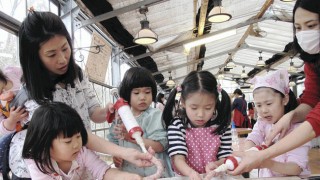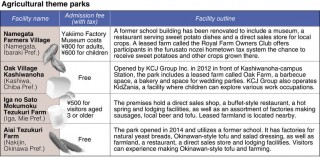Loading
Search
▼ Agricultural Theme Parks Cropping Up Nationwide
- Category:Other
By Wakako Takeuchi / Yomiuri Shimbun Staff Writer
People who don’t mind getting their hands dirty could do worse than visit one of the agricultural theme parks that have opened around the country in recent years. Visitors will be able to have various farming experiences, purchase agricultural products and enjoy good food. These theme parks help enhance agricultural competitiveness by drawing attention to the so-called sixth industry of agriculture, in which production, processing and distribution — the primary, secondary and tertiary industries — are vertically integrated.
Urban residents supportive
Agricultural theme parks are often complex facilities equipped with rental farmland, direct sales shops for agricultural products, restaurants and processing factories. Though municipalities have operated agricultural parks before, large-scale agricultural theme parks have been increasing over the past few years in response to such trends as the entry of private companies into the agricultural industry.
Seiji Yoshioka, a senior official of the Organization for Urban-Rural Interchange Revitalization, a general incorporated foundation, said:
“Agricultural parks and experience-oriented facilities are designed to vitalize local communities and promote local production for local consumption. People living in urban areas support [these facilities], saying they can really feel the change in seasons here.”
Full of sweet potatoes
Namegata Farmers Village is a sweet potato theme park that opened in autumn last year in Namegata, Ibaraki Prefecture, an area noted for its sweet potato production. The theme park is operated by Namegata Shirohato Farm, an agricultural corporation founded in part by Shirohato Food Corp., which produces and sells confectionery made from the potatoes and is based in Moriguchi, Osaka Prefecture. The JA Namegata agricultural cooperative and local farmers came up with a total investment of ¥300 million to operate the theme park.
Toshikazu Nagao, president of Shirohato Food Corp., said: “The number of sweet potato producers has dropped due to the aging population. We thought up the idea to convey the charm of agriculture to young people who moved to urban areas because they didn’t want to take over from aging farmers, aiming to secure a stable future for sweet potatoes.”
People who don’t mind getting their hands dirty could do worse than visit one of the agricultural theme parks that have opened around the country in recent years. Visitors will be able to have various farming experiences, purchase agricultural products and enjoy good food. These theme parks help enhance agricultural competitiveness by drawing attention to the so-called sixth industry of agriculture, in which production, processing and distribution — the primary, secondary and tertiary industries — are vertically integrated.
Urban residents supportive
Agricultural theme parks are often complex facilities equipped with rental farmland, direct sales shops for agricultural products, restaurants and processing factories. Though municipalities have operated agricultural parks before, large-scale agricultural theme parks have been increasing over the past few years in response to such trends as the entry of private companies into the agricultural industry.
Seiji Yoshioka, a senior official of the Organization for Urban-Rural Interchange Revitalization, a general incorporated foundation, said:
“Agricultural parks and experience-oriented facilities are designed to vitalize local communities and promote local production for local consumption. People living in urban areas support [these facilities], saying they can really feel the change in seasons here.”
Full of sweet potatoes
Namegata Farmers Village is a sweet potato theme park that opened in autumn last year in Namegata, Ibaraki Prefecture, an area noted for its sweet potato production. The theme park is operated by Namegata Shirohato Farm, an agricultural corporation founded in part by Shirohato Food Corp., which produces and sells confectionery made from the potatoes and is based in Moriguchi, Osaka Prefecture. The JA Namegata agricultural cooperative and local farmers came up with a total investment of ¥300 million to operate the theme park.
Toshikazu Nagao, president of Shirohato Food Corp., said: “The number of sweet potato producers has dropped due to the aging population. We thought up the idea to convey the charm of agriculture to young people who moved to urban areas because they didn’t want to take over from aging farmers, aiming to secure a stable future for sweet potatoes.”
Namegata Farmers Village covers a total area of about 33 hectares, utilizing abandoned farmland, while a former primary school is used as the main facility. Features of the theme park include the Yakiimo Factory Museum, a restaurant, a direct sales shop for agricultural products and rental farmland. Classes for making sweet potato cakes are popular among families with children. A fee of ¥800 is charged.
Sausage-making experience
Iga no Sato Mokumoku Tezukuri Farm pioneered the concept of agricultural theme parks. About 500,000 people annually visit the theme park in Iga, Mie Prefecture. The farm dates back to 1988, when Moku Moku Tezukuri Farm Co., an agricultural corporation, opened a ham factory to improve the added value of Iga pork, a local brand. Chairman Osamu Kimura, a native of the prefecture, was instrumental in its foundation.
The place was renovated and expanded as an agricultural park in 1995. Local beer, bread and tofu are now produced at the 14-hectare farm. The agricultural corporation also operates tomato and strawberry farms in the neighborhood. Visitors can experience making sausages in a factory, enjoy being close to animals and eat at a restaurant. The company has been producing its brand of rice in cooperation with contracted farmers since 1995. It has a yearly turnover of about ¥5.4 billion as a group.
Since the Trans-Pacific Partnership trade pact was officially agreed upon, Chinese, South Koreans and other foreigners have been visiting the theme park to observe its operations because of its success. “I think the sixth industry is the future direction of agriculture. It should also lead to the preservation of the local rustic scenery,” President Naoyuki Matsuo said.
Sausage-making experience
Iga no Sato Mokumoku Tezukuri Farm pioneered the concept of agricultural theme parks. About 500,000 people annually visit the theme park in Iga, Mie Prefecture. The farm dates back to 1988, when Moku Moku Tezukuri Farm Co., an agricultural corporation, opened a ham factory to improve the added value of Iga pork, a local brand. Chairman Osamu Kimura, a native of the prefecture, was instrumental in its foundation.
The place was renovated and expanded as an agricultural park in 1995. Local beer, bread and tofu are now produced at the 14-hectare farm. The agricultural corporation also operates tomato and strawberry farms in the neighborhood. Visitors can experience making sausages in a factory, enjoy being close to animals and eat at a restaurant. The company has been producing its brand of rice in cooperation with contracted farmers since 1995. It has a yearly turnover of about ¥5.4 billion as a group.
Since the Trans-Pacific Partnership trade pact was officially agreed upon, Chinese, South Koreans and other foreigners have been visiting the theme park to observe its operations because of its success. “I think the sixth industry is the future direction of agriculture. It should also lead to the preservation of the local rustic scenery,” President Naoyuki Matsuo said.
- May 24, 2016
- Comment (0)
- Trackback(1)



